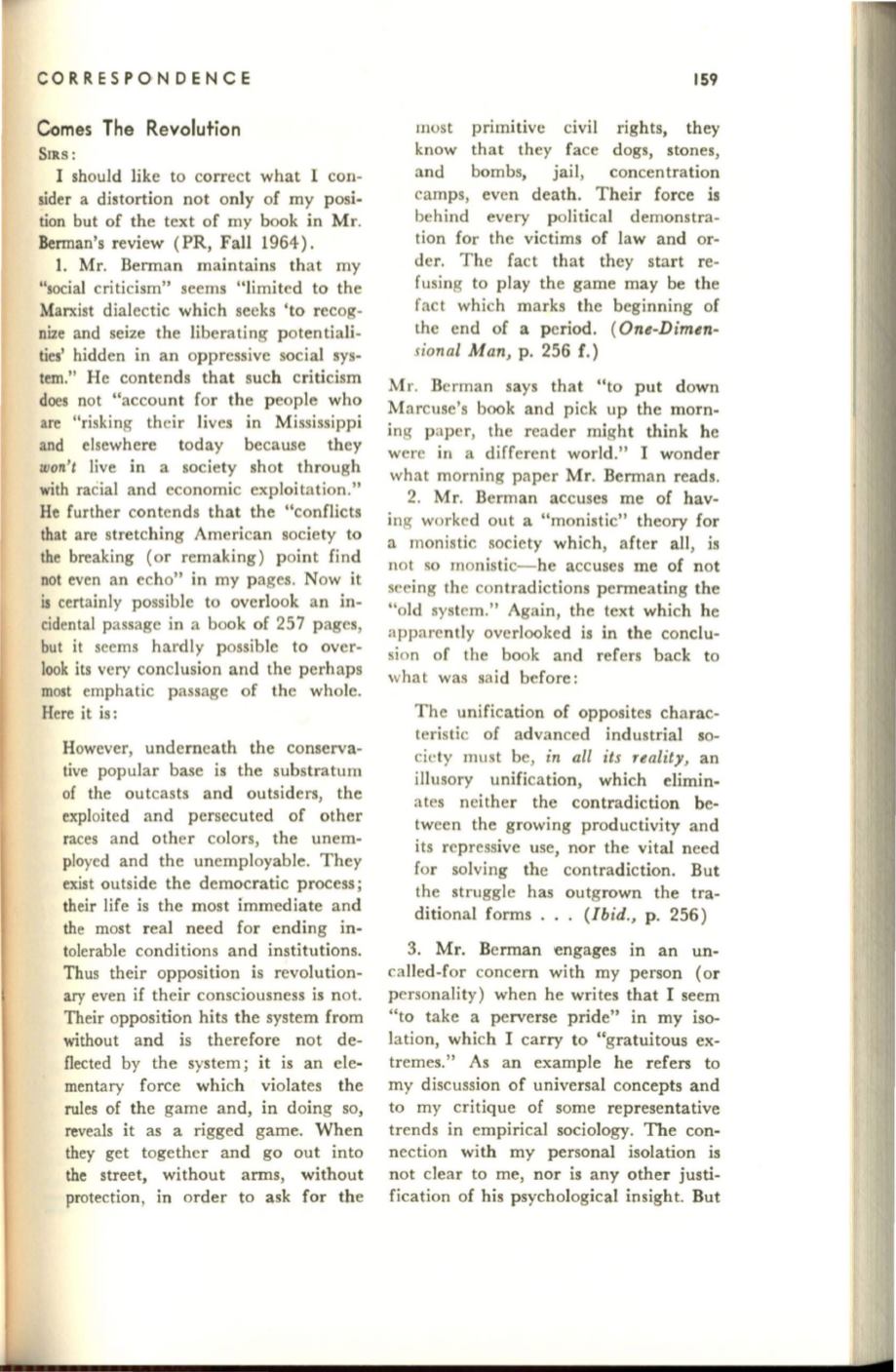
CORRESPONDENCE
Comes The Revolution
SIRS:
I should like to correct what I con–
sider a distortion not only of my posi–
tion but of the text of my book in Mr.
Berman's review (PR, Fall 1964).
1.
Mr. Berman maintains that my
"social criticism" seems "limited to the
Marxist dialectic which seeks 'to recog–
nize and seize the liberating potentiali–
ties' hidden in an oppressive social sys–
tem." He contends that such criticism
does not "account for the people who
are "risking their lives in Mississippi
and elsewhere today because they
won't
live in a society shot through
with raCial and economic exploitation."
He further contends that the "conflicts
that are stretching American society to
the breaking (or remaking) point find
not even an echo" in my pages. Now it
is certainly possible to overlook an in–
cidental passage in a book of 257 pages,
but it seems hardly possible to over–
look its very conclusion and the perhaps
most emphatic passage of the whole.
Here it is:
However, underneath the conserva–
tive popular base is the substratum
of the outcasts and outsiders, the
exploited and persecuted of other
races and other colors, the unem–
ployed and the unemployable. They
exist outside the democratic process;
their life is the most immediate and
the most real need for ending in–
tolerable conditions and institutions.
Thus their opposition is revolution–
ary even if their consciousness is not.
Their opposition hits the system from
without and is therefore not de–
flected by the system; it is an ele–
mentary force which violates the
rules of the game and, in doing so,
reveals it as a rigged game. When
they get together and go out into
the street, without arms, without
protection, in order to ask for the
159
most primitive civil rights, they
know that they face dogs, stones,
and bombs, jail, concentration
camps, even death. Their force is
behind every political demonstra–
tion for the victims of law and or–
der. The fact that they start re–
f
using to play the game may be the
fact which marks the beginning of
the end of a period.
(One-Dimen–
sional Man,
p. 256
f.)
Mr. Berman says that "to put down
Marcuse's book and pick up the morn–
ing paper, the reader might think he
were in a different world." I wonder
what morning paper Mr. Berman reads.
2. Mr. Berman accuses me of hav–
ing worked out a "monistic" theory for
a monistic society which, after all, is
not so monistic-he accuses me of not
seeing the contradictions permeating the
"old system." Again, the text which he
apparently overlooked is in the conclu–
sion of the book and refers back to
what was said before:
The unification of opposites charac–
teristic of advanced industrial so–
ciety must be,
in all its reality,
an
illusory unification, which elimin–
ates neither the contradiction be–
tween the growing productivity and
its repressive use, nor the vital need
for solving the contradiction. But
the struggle has outgrown the tra–
ditional forms ...
(Ibid.,
p. 256)
3. Mr. Berman engages in an un–
called-for concern with my person (or
personality) when he writes that I seem
"to take a perverse pride" in my iso–
lation, which I carry to "gratuitous ex–
tremes." As an example he refers to
my discussion of universal concepts and
to my critique of some representative
trends in empirical sociology. The con–
nection with my personal isolation is
not clear to me, nor is any other justi–
fication of his psychological insight. But


